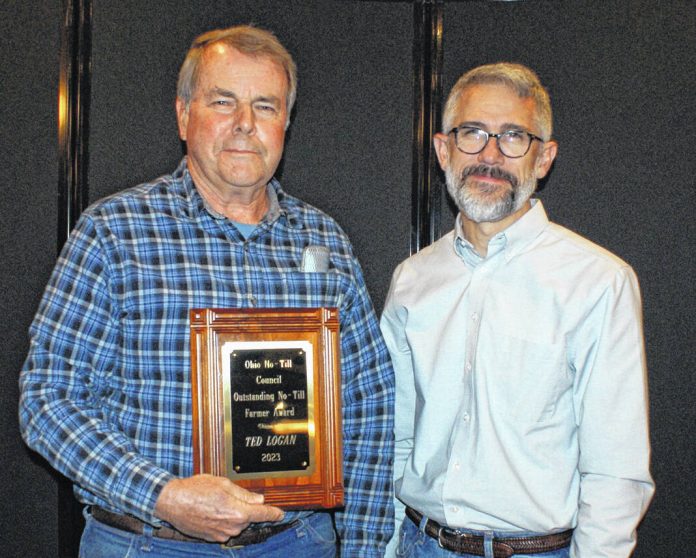Ted Logan of Logan Farms was named Outstanding No-Till Farmer of the Year for 2023 at the Ohio No-Till Conference held Dec. 6, 2023 in Plain City.
Logan is now farming 1,000 acres of corn, soybeans, and cover crops of wheat, cereal rye and alfalfa on his farm near Mount Gilead. For many years, the Logan family has been known for growing potatoes along with dairy production.
The Logan history goes back to Scotland when Logan said the first Logans immigrated to New Jersey in the mid 1700s. From New Jersey, they moved to Knox County in 1812 and came to Morrow County in 1862. Logan said it was common for farmers to raise potatoes in the 1800s.
It was his grandfather Earnest Jefferson (EJ) Logan who first began raising potatoes commercially when his sons — Richard, Jack and Ivan — returned to the farm in the 1930s. At the height of the Logan potato business, they sold potatoes to Geyer’s, Weaver’s IGA, Kroger, and Buehler’s markets.
Over the years, Ted Logan came to realize the Logan farm’s clay and loam soil was not the best suited for potatoes. It required moldboard plowing every three years, and the soil was getting hard. Growing potatoes and milking cows was also very labor intensive. They also tried growing u-pick strawberries for seven or eight years but couldn’t find the workers who liked to do the weeding.
About 15 years ago, Logan switched to no-till with more use of cover crops. He plants corn and soybeans in green, growing cover crops such as wheat and cereal rye. This helps “cover” and suppress the weeds as well as helping the soil retain moisture.
With good prices for corn and soybeans and less cost for labor and management, the farm became more profitable. Logan said farming also became less of a “grind” when he wasn’t tied to milking cows. Logan recalled there were about 30 dairy farms in Morrow County when he came to the farm after college in the late 1970s. Now, just three dairy farms remain in the county.
“These days you’ve got to be big to be successful with dairy, chicken and swine,” Logan said.
Logan calls the transition to no-till “very long term.” It took three to five years to begin to see a difference in the soil.
“I could see the soil improve some every year.” Logan said.
Logan is the most enthusiastic about no-till farming when he talks about the change and improvement in the soil since he made the transition from growing potatoes and milking cows to growing cover crops that keep fields green in early spring.
“When you till it frequently like we used to, the soil just gets very hard,” Logan explained to Matt Reese in a Jan. 11 Ohio Country Journal online article. “The organic levels were down to 1% or lower. … Organic matter is up to 3.5% and 4% now. That can tide you over in the dry times – and the soil is so resilient.
“When you keep the ground undisturbed there’s just so many microorganisms, worms and things like that can really help with soil health,” Logan added.
Logan graduated from The Ohio State University with a degree in agronomy. He heard about no-till farming at OSU Extension seminars and meetings. He especially appreciates OSU’s Jim Hoorman whose “enthusiasm for no-till was infectious.” Logan emailed Hoorman questions and received answers from him as he began practicing no-till farming.
Logan also said he learns from other farmers and is aware that using cover crops is a “blended practice” for many farms in Morrow County. Soybeans are the most often grown with cover crops, with it being less common with corn. A few farms go all in with cover crops as he does.
Logan said he feels almost semi-retired with the transition to no-till farming from potatoes and dairy production. However, the Logen Farms tradition of passing to the next generation is in question as Logan’s daughter Jeanette has a career is in floral designing, and his son Brett is a mechanical engineer in Pennsylvania.
Morrow County’s OSU Extension Educator Carri Jagger said she is aware of a few other farmers who plant cover crops and practice no-till. However, no record of cover crop acreage is kept by extension, NRCS, or FSA agriculture agencies. Jagger has had classes for cover crops in the past and planted cover crops in the agronomy research plots at the county farm.
“I am very happy that Ted got the award because he was very deserving of it,” Jagger said.
Alberta Stojkovic is a correspondent for The Morrow County Sentinel.





